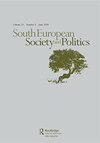Regaining Trust: Evidence-Informed Policymaking during the First Phase of the Covid-19 Crisis in Greece
IF 4.6
1区 社会学
Q1 POLITICAL SCIENCE
引用次数: 8
Abstract
Analysing the handling of the pandemic's first phase in Greece, the article attempts to explain the reasons for its relative success. It suggests four main reasons: First, the predominance of evidence-informed policymaking led by strong and decisive leadership. Second, a timely and firm crisis response, driven by the prior experience of other European countries with the pandemic. Third, the public sector's digital turn and a tight scheme of intra-government coordination. Fourth, a transparent and effective communication strategy signalling that public health was a priority, which subsequently led to high citizen compliance with the restrictive measures. The second phase of the pandemic is also discussed to nuance this claim and show that the long duration of the crisis brought new challenges to its management. The article provides insights into how countries with limited resources and weak administrative capacity can effectively manage such crises.重获信任:希腊新冠肺炎危机第一阶段的循证决策
本文分析了希腊对疫情第一阶段的处理,试图解释其相对成功的原因。它提出了四个主要原因:首先,在强有力和果断的领导下,循证决策占据主导地位。第二,在其他欧洲国家以往应对大流行病的经验的推动下,及时、坚定地应对危机。第三,公共部门的数字化转型和紧密的政府内部协调方案。第四,一项透明和有效的沟通战略,表明公共卫生是一项优先事项,随后导致公民高度遵守限制性措施。还讨论了大流行病的第二阶段,以使这一说法有所不同,并表明危机的长期持续给其管理带来了新的挑战。本文对资源有限、行政能力薄弱的国家如何有效管理此类危机提供了深刻见解。
本文章由计算机程序翻译,如有差异,请以英文原文为准。
求助全文
约1分钟内获得全文
求助全文
来源期刊

South European Society and Politics
Multiple-
CiteScore
5.80
自引率
21.20%
发文量
14
期刊介绍:
A leading point of reference for scholars of Southern Europe, South European Society and Politics promotes both comparative and inter-disciplinary analyses, as well as offering innovative single county and sub-national studies. The journal acts as a forum for social, economic, cultural, contemporary historical and political approaches to research on the region, and is particularly keen to sponsor policy–focused studies in all these disciplines. The journal publishes research articles; South European Atlas with election reports and articles on other subjects of topical interest, and an extensive book reviews section, including both review articles and individual book reviews.
 求助内容:
求助内容: 应助结果提醒方式:
应助结果提醒方式:


